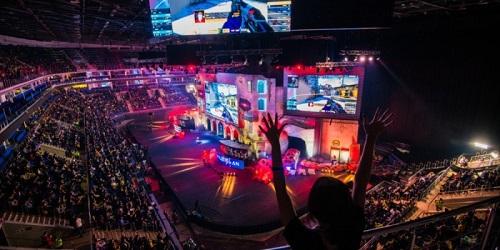ESports Market value projected to expand by 2024 - 2032

ESports Market Analysis
The eSports market has witnessed exponential growth over the past decade, evolving from a niche hobby into a multi-billion-dollar industry. This transformation is driven by several factors, including technological advancements, increased internet accessibility, and the rise of streaming platforms. The global eSports market size is projected to reach approximately $7,191.6 million in revenue, with a compound annual growth rate (CAGR) of around 20.9% from 2023 to 2032. The audience for eSports is also expanding rapidly, with millions of viewers tuning in to watch competitive gaming events across various platforms.
Market Key Players
The eSports ecosystem comprises numerous key players that contribute to its growth and sustainability. Prominent game publishers such as Riot Games, Activision Blizzard, and Valve Corporation play a crucial role by developing popular titles like League of Legends, Call of Duty, and Dota 2. Additionally, major tournament organizers like ESL Gaming and DreamHack are pivotal in hosting large-scale competitions that attract both players and audiences.
Furthermore, streaming platforms such as Twitch and YouTube Gaming have become essential for broadcasting events and engaging fans. Sponsorships from brands like Intel, Red Bull, and Coca-Cola also significantly impact the financial landscape of eSports.
[PDF Brochure] Request for Sample Report:
https://www.marketresearchfuture.com/sample_request/11277
Market Segmentation
The eSports market can be segmented based on various criteria including game type, revenue source, age group of participants, and geography. Game types typically include first-person shooters (FPS), multiplayer online battle arenas (MOBA), real-time strategy (RTS), and sports simulation games. Revenue sources are primarily categorized into sponsorships, media rights, merchandise sales, ticket sales for live events, and in-game purchases. Age segmentation shows that the majority of participants fall within the 18-34 age bracket; however, there is a growing interest among younger audiences as well. Geographically, North America holds a significant share of the market due to its established infrastructure and high viewership rates; however, Asia-Pacific is rapidly emerging as a dominant region due to its vast player base.
Market Drivers
Several key drivers are propelling the growth of the eSports market. Firstly, the increasing popularity of video games among younger demographics has led to higher participation rates in competitive gaming. Secondly, advancements in technology have improved gaming experiences through better graphics and faster internet speeds which enhance viewer engagement during live streams or tournaments. Thirdly, social media platforms have facilitated community building among gamers and fans alike; this interconnectedness fosters loyalty towards specific games or teams. Lastly, traditional sports organizations are increasingly investing in eSports teams or leagues which legitimizes competitive gaming further.
Market Opportunities
As the eSports industry continues to grow rapidly, numerous opportunities arise for stakeholders involved in this space. One significant opportunity lies in expanding educational programs focused on game design or professional gaming skills which can cater to aspiring players or developers alike. Additionally, there is potential for innovative monetization strategies such as subscription-based models for exclusive content or premium viewing experiences during tournaments. The integration of virtual reality (VR) technology presents another avenue for enhancing user experience during gameplay or live events; this could attract more viewers who seek immersive experiences.
Regional Analysis
Regionally speaking, North America remains at the forefront of the eSports market due to its robust infrastructure supporting tournaments alongside high levels of investment from sponsors seeking brand visibility within this demographic segment. Europe follows closely behind with countries like Germany leading in terms of player engagement while also hosting some prominent tournaments annually such as ESL One Cologne or DreamHack Masters Malmö. Meanwhile, Asia-Pacific stands out due to its massive player base, particularly in countries like China where mobile gaming dominates; here local leagues have gained immense popularity contributing significantly towards overall revenues generated within this sector.
Industry Updates
Recent developments indicate an ongoing trend toward mainstream acceptance of eSports within traditional sports frameworks; notable collaborations between established sports franchises with professional gamers highlight this shift towards convergence between these two worlds—such partnerships often result in cross-promotional opportunities benefiting both parties involved financially while broadening their respective audiences simultaneously! Furthermore regulatory bodies are beginning to recognize competitive gaming formally leading towards potential standardization across various regions ensuring fair play practices amongst competitors thereby fostering trustworthiness amongst fans who invest time watching these events unfold live!
Browse In-depth Market Research Report:
https://www.marketresearchfuture.com/reports/e-sports-market-11277
- Questions and Answers
- Opinion
- Story/Motivational/Inspiring
- Technology
- Art
- Causes
- Crafts
- Dance
- Drinks
- Film/Movie
- Fitness
- Food
- Juegos
- Gardening
- Health
- Home
- Literature
- Music
- Networking
- Other
- Party
- Religion
- Shopping
- Sports
- Theater
- Wellness
- News
- Culture
- War machines and policy

